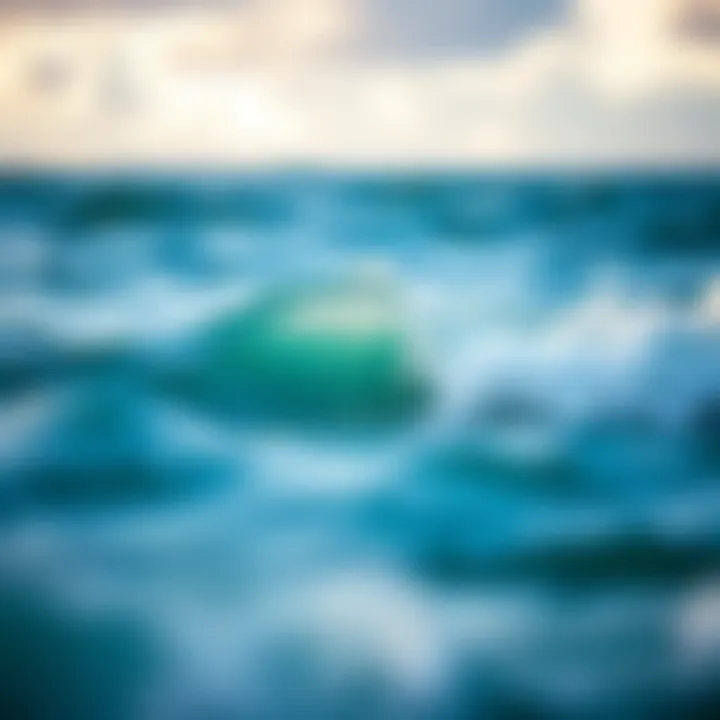Discover the Therapeutic Power of Ocean Wave Sounds for Sleep


Intro
In our fast-paced world, sleep often eludes many. While some may turn to pharmacological solutions, the natural remedy of ocean wave sounds presents itself as a tranquil escape. This soothing audio experience holds the potential to transform our nightly rituals, enhancing both sleep quality and overall well-being. Beyond the immediate benefits of a good night’s rest, the rhythmic crashing of waves has been linked to various therapeutic advantages, aiding mental health and fostering a serene environment conducive to relaxation.
Imagine the feeling of sand beneath your toes and the distant call of seagulls, paired with the gentle, lapping sound of waves. These are not merely recreational or pastoral scenes; they serve a deeper purpose in our lives. The practice of utilizing sound therapy, particularly ocean waves, is more than just listening; it’s about creating a profound sense of comfort that calms the mind and prepares the body for rejuvenation.
This article will delve into the calming effects of ocean wave sounds, emphasizing their therapeutic benefits. We will also provide practical guidance on how to find and incorporate these soothing sounds into daily practices, ensuring that a restful night's sleep is not just a dream, but a reality for many.
Tips and Techniques
Integrating Ocean Sounds into Your Sleep Routine
Incorporating ocean wave sounds into your evening routine doesn’t require a PhD in sound therapy. It’s about creating an environment that nurtures peace. Here are some practical steps to get you started:
- Choose the Right Platform: There are multiple platforms—Spotify, YouTube, and special apps such as Sleep Sounds or Relax Melodies. Experiment to find the version of ocean waves that resonates with you.
- Volume Matters: Keep the volume at a level that is soothing, not intrusive. A soft background hum can be more effective than a loud crash.
- Pair with Breathing Exercises: As you listen, practice deep breathing. Inhale for a count of four, hold for four, and exhale for six. This technique can increase relaxation and amplify the calming effects of the sounds.
Creating the Perfect Ambiance
The right setting amplifies the benefits of ocean sounds. Consider the following techniques:
- Lighting: Dim the lights or use candles to create a relaxing atmosphere. Avoid harsh lighting that might distract you.
- Comfortable Space: Arrange your bedding and pillows for maximum comfort. The goal is to form a nook that’s specifically set for relaxation.
- Limit Distractions: Keep phones on silent. Any notifications can disrupt the flow into sleep that ocean sounds facilitate.
Science Behind Ocean Sounds
Research indicates that natural sounds may significantly affect our mental state. Studies have shown that rhythmic sounds, like those of ocean waves, can lower stress hormones and promote relaxation. For instance:
"Natural soundscapes, particularly water sounds, have been shown to lower blood pressure and enhance relaxation."
Source: American Psychological Association
Ocean sounds mimic white noise, which helps mask disruptive sounds. This masking reduces disturbances during sleep, fostering undisturbed rest. So, whether it’s the crackling of a bonfire or the consistent breaking of waves, these sounds can act as sound barriers from the chaos outside.
End
In summary, the therapeutic benefits of ocean wave sounds extend far beyond mere relaxation. They can fundamentally alter our approach to sleep, promoting both mental health and well-being. By integrating these sounds into our sleep routines, we move closer to embracing more restful nights and rejuvenated mornings. For those seeking peace in their slumber, nature’s soundtrack might just be the answer.
Understanding Sleep and Its Importance
Sleep plays a crucial role in our daily lives, yet many people underestimate its significance. It's not merely a period of rest; it is a dynamic state where vital physiological processes occur. Understanding sleeep can expose its profound impact not just on performance—whether in sports, work, or daily activities—but also on mental health and emotional well-being.
The importance of sleep becomes glaring when considering how our bodies function. During sleep, the brain consolidates memories and processes information. It’s a time for repair and growth, allowing for the replenishment of neurotransmitters that support learning and memory. In essence, a good night’s sleep prepares us for the challenges of the next day, enabling us to function at our best.
To further illustrate this, imagine a marathon runner who has just completed an extensive training session. If this athlete neglects sleep, they won’t recover properly, leading to diminished performance and higher chances of injury. Similarly, educators and bloggers alike rely on mental clarity to produce cohesive content or teach effectively. Sleep is not merely a luxury but a necessity for optimal functioning.
Moreover, adequate sleep fosters emotional stability. It acts as a cushion against stress, reducing irritability and enhancing our ability to cope with life's challenges. For individuals dealing with mental health issues like anxiety or depression, a regular sleep pattern is often recommended as part of the therapeutic process.
Incorporating soothing sounds, such as ocean waves, can be one impactful way to enhance sleep quality. This connection between sound and sleep forms the foundation for this article's exploration of ocean wave sounds and their therapeutic benefits.
"Good sleep is a pillar of health, directly influencing mental and physical well-being."
The intertwining of sleep with overall health underscores the need to prioritize it in our daily routines. Whether you’re an athlete looking to optimize your training or a blogger aiming to cultivate creativity, understanding the importance of sleep can unlock pathways to success.
As we delve deeper, we’ll explore the science that underscores the effects of sleep and how sound—specifically, the calming whispers of ocean waves—can enhance this essential function.
The Role of Sound in Sleep
Sound plays a pivotal role in influencing sleep quality and overall well-being. As such, understanding its impact on sleep helps in harnessing its beneficial effects, especially through soothing sounds like ocean waves. The mere act of drifting into sleep can be fraught with disturbances from environmental noise, personal thoughts, or even anxiety. Here, the right kind of sound can serve as a gentle guide to a more restful night.
It is essential to note that sound does not merely affect the listeners; it interacts with their environment. Certain sounds can trigger relaxation responses in the brain, paving the way for easier transitions into deeper sleep phases. Furthermore, soothing soundscapes can mask disruptive noises, enabling a continuous flow of slumber. In a world where many struggle with sleep deprivation, sound might be the unsung hero in the quest for quality rest.
Being mindful of what you listen to before bedtime can make a significant difference. In many cases, the right sounds foster a sense of tranquility, helping to ease the mind and diminish stress. Conversely, the wrong sounds can keep you tossing and turning.
In summary, exploring the role of sound in sleep emphasizes its importance in creating a restful atmosphere conducive to high-quality sleep.
How Sound Affects Sleep Quality
Research indicates that sound can both provoke and alleviate sleep disturbances. The right sounds work by lowering heart rates and reducing the body’s stress response. Some people might find that ambient noise, such as the gentle crash of ocean waves, helps them wind down. Conversely, abrupt sounds like loud music or traffic can trigger alertness, leading to restless nights.
The relationship between sound and sleep quality can often be examined through the lens of sleep stages. Good, deep sleep aids in physical recovery and mental clarity, while interruptions can lead to fragmented rest. Understanding this relationship encourages individuals to curate their sound environment strategically.
"Sleep is not merely a time of inactivity, but a dynamic state crucial for health. Sound plays a defining role within this context."


In practical terms, incorporating pleasant background sounds like ocean waves can lead to longer duration in REM sleep—crucial for emotional and memory processing. By promoting relaxation, soothing soundscapes help enhance sleep quality.
Types of Soundscapes for Sleep
When it comes to selecting soundscapes for enriching sleep, one can consider a variety of choices:
- Natural Sounds: These include ocean waves, rainfall, and rustling leaves. Each of these helps in crafting a calming atmosphere.
- White Noise: A steady hum that masks disruptive noises; many find it incredibly effective at promoting rest.
- Music: Soft melodies, particularly instrumental, can help in calming the mind and body.
- Guided Meditation: For some, the vocal tones and breathing techniques can lead to deeper relaxation.
Notably, ocean wave sounds stand out for their universal appeal and soothing quality. The gentle rise and fall can mimic the rhythms of the body and mind, acting as a natural lullaby. As people explore these soundscapes, the key is to find what resonates best with their personal preferences, making it easier to drift off peacefully.
Ocean Wave Sounds: An Overview
Ocean wave sounds play a vital role in enhancing our sleep quality, bringing a natural touch of serenity that many find elusive in our fast-paced lives. These sounds not only offer an auditory escape but also serve as an effective tool for relaxation and mental well-being. As we delve deeper, we’ll explore the unique characteristics of ocean wave sounds and their cultural significance, shedding light on why they are considered a powerful ally in the quest for better sleep.
Characteristics of Ocean Wave Sounds
Ocean wave sounds are characterized by their rhythmic ebb and flow, mimicking the movements of the sea. This natural surge creates a soothing backdrop that can mask disruptive noises, making it easier for individuals to drift off. The gentle crashing of waves varies in tone and intensity, which can evoke feelings of harmony and safety. In terms of frequency, ocean sounds generally fall within the binaural range, which are particularly effective at promoting relaxation. Here are some specific features:
- Frequency Range: Ocean wave sounds often hover around the lower frequency spectrum, which many find calming.
- Variability: The sound of waves changes with the conditions of the ocean, making each listening experience unique.
- Natural White Noise: These sounds act as a form of white noise, helping to drown out distractions in the environment.
Research indicates that listening to these sounds can lead to reduced cortisol levels, resulting in diminished stress and anxiety. As a result, individuals might experience a faster onset of sleep, deeper sleep phases, and improved overall sleep quality.
Importantly, the nature of ocean wave sounds not only aids in relaxation but teaches the brain to associate these sounds with rest. Over time, this connection can foster a more reliable sleep pattern, benefiting those who face challenges like insomnia or irregular sleeping habits.
Cultural Significance of Ocean Sounds
The sounds of the ocean have held a significant place in many cultures around the world. Different societies have regarded the ocean as both a source of life and a space for introspection. For instance, coastal communities have long recognized the healing power of the sea, incorporating its sounds into spiritual practices and rituals. Here are a few noteworthy points about its cultural significance:
- Symbol of Healing: Many indigenous cultures perceive the ocean as a therapeutic force, believing that the sound of waves can cleanse the mind and body.
- Art and Literature Influence: Countless artists, writers, and musicians have drawn inspiration from ocean sounds, integrating them into works to evoke tranquility and reflection.
- Modern Day Practices: In contemporary wellness practices, ocean sounds are featured in yoga studios and meditation sessions, signifying their enduring importance in relaxation.
By understanding the rich tapestry of how ocean wave sounds positively influence individuals both psychologically and culturally, we can appreciate their therapeutic benefits even more. As we move forward in this article, the relevance of ocean sounds becomes even more pronounced as we examine their practical applications in sleep routines.
Therapeutic Benefits of Ocean Wave Sounds
Ocean wave sounds possess a unique ability to promote tranquility, making them particularly valuable in a world where stress and anxiety abound. The therapeutic benefits tied to these sounds are numerous and pertain to various aspects of human well-being. Understanding how ocean wave sounds can enhance sleep quality, ease tension, and provide a soothing ambiance is crucial, especially for individuals looking to improve their mental health and overall restfulness.
Reducing Stress and Anxiety
When stress levels run high, it can feel like a weight on one's shoulders. Ocean wave sounds act as a form of natural therapy, creating an auditory backdrop that can effectively mitigate feelings of anxiety. Various studies suggest that listening to these soothing sounds can activate the brain regions responsible for relaxation while reducing the production of stress hormones.
The rhythmic crashing of waves helps to drown out intrusive thoughts that often plague our minds when trying to unwind. Consciously tuning into the gentle ebb and flow of ocean sounds may shift focus away from life’s pressures. This phenomenon is sometimes explained through the concept of "white noise", where the consistent sound creates a secure barrier against disruptive external noises.
- For instance, one might find that the sounds of a gentle surf can aid in calming racing thoughts before bed, which can ultimately lead to a more restful night.
- Importantly, individuals prone to anxiety often report an immediate decrease in their stress response when they engage with these natural sounds.
Promoting Relaxation and Calmness
Bringing the ocean into your space can serve as a simple yet effective means of cultivating a calming environment. The ambiance created by ocean wave sounds can transition a hectic atmosphere into one rich with tranquility. As individuals seek to establish a sleep routine or a moment of relief amidst the chaos of daily life, these sounds can serve as a powerful tool.
The qualities of ocean sounds promote a deep sense of peace, encouraging the body to let go of tension. This is largely because:
- The neutral and predictable nature of the sound can help in lessening the hyper-arousal state associated with stress.
- Listening to these waves can lower heart rates and bolster feelings of calmness, allowing for deeper breaths and relaxation of muscles.
In practice, individuals often report that listening to ocean wave sounds while meditating or during periods of deep relaxation significantly enhances their experience. Incorporating these sounds into one’s sleep ritual could effectively signal to the body that it’s time to wind down.
Practical Applications of Ocean Wave Sounds
The therapeutic benefits of ocean wave sounds extend far beyond simple relaxation. These soothing sounds can play a critical role in sleep hygiene and well-being in various ways. Understanding how to practically apply ocean sounds into daily life enhances their effectiveness, making it easier to incorporate them into routines. This section sheds light on specific avenues where these sounds can be leveraged, offering practical advice and insights.
Where to Find Free Ocean Wave Sounds
Finding free ocean wave sounds can be easier than you might think. The internet is a treasure trove for these auditory gems. Here are some popular platforms:
- YouTube: A multitude of channels offer uninterrupted ocean waves, often designed specifically for sleep or relaxation. Just search for terms like "ocean waves for sleep" to dive right in.
- SoundCloud: Many independent artists and sound creators upload high-quality ocean sound tracks. It's a fantastic resource for discovering unique compositions.
- Apps: Consider downloading sleep or meditation apps like Calm or Headspace, which frequently feature ocean wave sounds as part of their offerings. Some even provide customizable soundscapes that allow you to blend various elements.
- Websites: Websites such as freesound.org host a variety of sound samples, including ocean waves, uploaded by users globally.
Incorporating Wave Sounds into Sleep Routines
Integrating ocean wave sounds into sleep routines can set the mind at ease, paving the way for quality rest. Here are a few practical strategies for doing so:
- Set a Sleep Environment: Dim the lights in your bedroom, and ensure the room temperature is comfortable. This creates a sanctuary for sleep. Then, play ocean sounds softly in the background. Ensure it’s at a volume that you can hear, but isn’t distracting.
- Use Sleep Timers: If you worry about the sound playing all night, use timers available on many apps and devices. This way, you can enjoy the calming ocean sounds to help fall asleep without worrying about it running through the night.
- Combine with Other Relaxation Techniques: Consider using wave sounds in conjunction with deep breathing exercises or gentle yoga. This multi-faceted approach can greatly amplify relaxation and focus, making it easier to slip into slumber.
Using Technology to Listen to Ocean Wave Sounds
Living in a tech-savvy world offers many ways to embrace the calming properties of ocean waves. Here’s how to make technology your ally:


- Smart Speakers: Devices like Amazon Echo or Google Home can stream ocean sounds with a simple voice command. Just ask for ocean waves, and let them fill your space. This can add a layer of convenience to your routine.
- White Noise Machines: Some machines specifically feature ocean sounds among their various settings. They’re designed to promote sleep and can offer a consistent sound environment.
- Bluetooth Speakers: For personalized soundscapes, pair your smartphone with a Bluetooth speaker. This way, you maintain control over playlists and volume, optimizing your listening experience.
As you embark on your journey to improve sleep through ocean wave sounds, these practical applications can help you incorporate nature’s serenity more effectively into your life. By exploring the various resources available and establishing a rhythm in your nightly routine, the benefits can quickly manifest, leading to better sleep and overall well-being.
Potential Downsides and Considerations
Exploring the therapeutic potential of ocean wave sounds brings to light a seemingly idyllic approach to enhancing sleep quality. However, it's also crucial to recognize that not everyone experiences these benefits uniformly. With every blessing comes a caveat; thus, understanding the potential downsides and considerations related to ocean wave sounds is paramount. This section discusses two key areas: how individual sensitivities to sound can impact the experience of using ocean wave sounds for sleep and the importance of finding a balance between background noise and silence.
Individual Sensitivities to Sound
Not everyone finds ocean wave sounds soothing. In fact, individuals vary significantly in their sensitivity to different types of noise. What might lull one person into a peaceful slumber could irritate another to the point of insomnia. Sensitivities to sound may arise from various factors including personal preference, psychological conditions, or even physical environments.
For example, some folks might have had negative experiences associated with ocean sounds—like a distressing storm while on a seaside holiday—that cause them to feel anxious when they hear these sounds again.
It's essential to be attuned to one’s own reactions when it comes to soundscapes. Here are a few important points to consider regarding individual sensitivities:
- Personal Preferences: Some people simply prefer silence or different types of sound environments for relaxation.
- Mental Health Factors: Conditions like hyperacusis can heighten a person's sound sensitivities, causing them to react negatively to even soft ocean waves.
- Environmental Influences: The setting in which the sounds are played may play a role. An unfamiliar or uncomfortable environment can amplify negative feelings.
If you find that ocean sounds don't work for you, don't hesitate to explore other options, like white noise or even gentle ambient music. Being mindful of one's sensitivity to sound could be the key to a more restful night.
Balancing Background Noise and Quiet
One of the tricky aspects of using ocean wave sounds for sleep is finding the right level of sound that leads to relaxation without becoming the center of one’s attention. Too low, and the sound may fade away; too loud, and it can disrupt concentration and invite stress instead of calmness. Striking a balance is akin to walking a tightrope.
Here are some elements to consider:
- Volume Control: Maintaining a moderate volume that provides comfort is vital. You don’t want the sound to overshadow your thoughts or increase anxiety; it should serve as a gentle embrace.
- Duration of Sounds: Some may find sustained soundscapes beneficial, while others might prefer shorter sessions, leading to potential disruptions in sleep with looping sounds. Experimentation is key.
- Context of Use: Consider the habit of your listening environment. If you’re in a noisy area, perhaps a richer mix of ocean sounds would be helpful. But if the aim is for a tranquil night with no extraneous noises, quiet moments might be more appropriate.
Sound therapy is nuanced, and practitioners should adjust their approaches based on individual needs for the most effective results.
Finding this balance can enhance the soothing qualities of ocean waves or any soundscape, enabling a better approach to tranquil sleep. As with any therapeutic method, awareness and attentiveness are crucial in meeting one's personal needs amidst the vast ocean of possibilities.
Comparing Ocean Wave Sounds to Other Natural Soundscapes
In exploring auditory experiences that promote sleep, it’s crucial to compare ocean wave sounds to other natural soundscapes. This comparison not only elucidates their unique qualities but also helps individuals select the most effective sounds for their relaxation routine. Each natural soundscape has distinct characteristics that evoke varying emotional and psychological responses, impacting the quality of sleep. Ocean wave sounds stand out in this realm, providing benefits that other soundscapes may not fully replicate.
Forest Sounds vs. Ocean Waves
When we think about sounds found in nature, forest noises often come to mind—birdsong, rustling leaves, and the distant patter of rain. Forest sounds are typically rich and layered, creating a complex auditory environment. This richness can promote relaxation; however, it may not always induce sleep effectively for everyone.
In contrast, ocean wave sounds often present a more consistent and rhythmic quality. The repetition of waves crashing and receding can feel like a gentle lullaby to many, creating a predictable pattern that helps the mind ease into a relaxed state. Individuals might find that while listening to forest sounds can spark intrigue or thought, ocean sounds promote a deeper sense of calm.
Some notable aspects to consider include:
- Repetition: Ocean waves have a steady cadence beneficial for drifting off to sleep.
- Simplicity: The straightforward nature of ocean sounds can prevent distractions that sometimes arise with richer soundscapes.
- Environmental Conditioning: For those who have experienced tranquility at the ocean, the sound of waves can trigger positive memories, enhancing the calming experience.
River Flow Sounds and Their Effects
River sounds, characterized by the gurgle of flowing water and occasional splashes as it hits rocks, present another alternative in the natural sound landscape. The serene quality of a flowing river can be soothing, much like ocean sounds. However, there is an essential difference: river sounds often change and vary abruptly due to obstacles in the water.
This variability might be soothing for many but can also create a stimulating environment for others, pulling attention away from relaxing. In contrast, the relatively unchanging rhythm of ocean waves creates a more stable auditory backdrop for sleep. Multiple studies indicate that more consistent sound patterns tend to provide a stronger association with relaxation than erratic soundscapes.
Key differences between river sounds and ocean waves include:
- Variability: River sounds fluctuate unpredictably, which can sometimes prevent total relaxation.
- Calming Effect: The ocean’s constant rhythm promotes a meditative state, ideal for falling asleep.
- Familiarity: For those who live near the coast or vacation by the beach, ocean sounds may foster a sense of safety and comfort, beneficial for winding down at the end of the day.
Ultimately, the selection of soundscapes should cater to personal preferences. For some, ocean wave sounds may provide the perfect backdrop for a restful night, while others might find that forest or river sounds resonate more truly with their auditory needs. Understanding these nuances can lead to a more customized approach to achieving better sleep.
The Intersection of Nature and Sleep Science
Understanding the relationship between nature and sleep is crucial for recognizing how soundscapes, especially ocean waves, impact our nightly rest. Nature, with its inherent rhythms and sounds, appears to harmonize with our biological processes. Embracing natural sounds not only enhances the quality of sleep but also promotes overall mental well-being. In this section, we will delve into the supportive research surrounding natural sounds, focusing on how they affect sleep patterns and the psychological benefits derived from listening to the soothing sounds of ocean waves.
Research Supporting Use of Natural Sounds
Recent studies indicate a strong correlation between natural soundscapes and improved sleep quality. A review published in the Journal of Sleep Research outlines findings from various experiments that confirm participants exposed to nature sounds, particularly ocean waves, experienced longer sleep duration and fewer disturbances during the night.
- Soundscapes Influence: The brain processes sounds differently in tranquil environments. For instance, an experiment led by sleep scientists revealed that individuals who listened to recordings of ocean waves reported a reduction in sleep onset latency, meaning they fell asleep faster.
- Physiological Responses: The sounds of waves, with their gentle ebb and flow, can invoke a relaxation response. This leads to a decrease in heart rate and lower levels of the stress hormone cortisol. Data suggest that regular exposure to these sounds may facilitate restorative sleep and enhance mood function throughout the day.
"Natural sounds not only create a calming atmosphere but also significantly optimize the body's sleep-wake cycle."
Ocean Sound Frequencies and Sleep Patterns
The frequencies embedded within ocean wave sounds carry a unique therapeutic potential. Research indicates that these specific frequencies resonate with our physiological responses, promoting deeper levels of sleep. Below are key points to consider regarding ocean sound frequencies:
- Frequency Range: Ocean waves typically produce low-frequency sounds that can be soothing to the listener. These sounds often range between 0.1 Hz to 20 Hz, aligning with theta brainwave patterns that are prevalent during deep relaxation and sleep.
- Impact on REM Sleep: Sleep studies have shown that participants listening to ocean wave sounds exhibited increased durations of REM sleep, which is essential for cognitive functions such as memory consolidation and emotional regulation.
- Binaural Beats and Ocean Sounds: Some research explores the combination of ocean wave sounds with binaural beats, where two different frequencies are played in either ear. This may enhance the relaxation response and further optimize sleep quality.


In summary, the intersection of nature and sleep science highlights compelling evidence for the use of ocean wave sounds as a tool in sleep therapy. These sounds not only promote relaxation, they also align with our body’s natural rhythms, maximizing restorative sleep. Foster this connection as you explore the therapeutic benefits of free ocean wave sounds.
Community and Personal Experiences
Understanding the therapeutic benefits of ocean wave sounds extends beyond just individual experiences; it ties into a broader community narrative that reflects a collective pursuit of wellness. The experiences shared among people regarding ocean sounds can provide insights into their impact on sleep and relaxation, revealing not only personal benefits but also a shared cultural appreciation for nature’s melodies. For athletes, educators, and bloggers, these narratives can inform instructional tools and guide personal practice.
By exploring shared experiences, individuals often find validation and connection, which is crucial for those seeking relief from stress or sleep issues. When people resonate with similar patterns, such as how ocean sounds transported them to a serene mental space, the dialogue surrounding these experiences fosters community support. Sometimes, just knowing that someone else has found solace in the rhythmic wash of waves can make a world of difference. Creating a supportive network that values the importance of self-care through natural remedies can be empowering.
Benefits of these shared experiences include:
- Validation: Individuals feel seen and understood when others share their journeys with ocean sounds.
- Cultural Connection: Different cultures have long valued the sounds of nature; sharing experiences can bridge cultural gaps.
- Method Exchange: People can discuss various methods for incorporating ocean sounds into their routines, leading to grows in practices like mindfulness or meditation.
It’s important to note that communities often cultivate unique adaptations of these practices based on their circumstances, further enriching the narrative surrounding ocean sounds and their calming benefits. Factors like geography, lifestyle, and even personal backgrounds play significant roles in how ocean wave sounds are perceived and utilized.
Shared Experiences with Ocean Wave Sounds
The power of storytelling around ocean wave sounds can influence individuals’ perceptions and practices. Anecdotes about experiences can serve as more than just interesting tales; they can highlight the nuances of integration into daily life. For instance, many report using ocean sounds while practicing yoga, which enhances their focus and improves their relaxation. Such experiences reveal a pattern of harmony between physical practices and auditory stimuli.
Personal stories illustrate how the fluid sounds of the ocean can trigger memories or feelings of peace, leading to restorative sleep. Some might describe falling asleep while listening to waves crash against the shore, recalling summer vacations or tranquil moments by the beach. These stories not only reveal the personal journey to better sleep but also the symbiotic relationship between sound and mental imagery.
Testimonials from Sleep Studies
Scientific inquiries into ocean wave sounds often cement the experiential narratives shared by individuals. Numerous sleep studies have examined the impact of natural sounds on sleep quality, revealing promising results. Many participants, when exposed to ocean sounds, noted improvements in their ability to fall asleep quickly and enjoy deeper cycles of rest.
A common finding among studies is the link between ocean wave frequencies and feelings of tranquility. Research indicates that specific sound frequencies can slow the heart rate and promote relaxation, leading to a more restful sleep. Such information also provides support to those advocating for natural sound therapy in sleep routines, reinforcing the idea that these experiences, however subjective, have a tangible basis in scientific examination.
In their testimonies, many participants resonate with the idea that these sounds drown out unwanted noises, laying the foundation for better mental environments conducive to sleep. The ability of ocean waves to foster quietude in a busy world can be an essential tool for many, suggesting that integrating ocean sounds into nightly rituals could be an effective strategy for improving sleep quality.
"Ocean sounds have transformed my nightly routine. The moment I press play, it feels like I’m being whisked away to a serene beach. I sleep like a baby!" - Testimonial from a sleep study participant
Future Research Directions
The exploration of ocean wave sounds in relation to sleep is gaining traction among researchers and health professionals. Understanding how these natural soundscapes can positively influence sleep patterns and overall health opens up a rich field for future inquiry. With a growing body of evidence supporting the therapeutic benefits of auditory experiences, there is an increasing need to delve deeper into specific aspects surrounding ocean wave sounds and their integration into sleep health strategies.
Exploring New Soundscapes and Technologies
In the realm of sound therapy, innovation is the name of the game. Future studies should consider the intersections of emerging technologies and soundscapes. Recent advancements in sound engineering, such as binaural beats and 360-degree sound environments, provide new avenues to amplify the effectiveness of soothing natural sounds like ocean waves.
Research can investigate how varying the frequency and intensity of ocean wave sounds interacts with individual sleep states. For example:
- High frequencies could be tested to determine if they are more effective in stimulating deeper stages of sleep.
- Customized soundscapes, where users can adjust volumes or mix ocean sounds with other soothing elements, might cater to personal preferences and sensitivities.
- Wearable technology could monitor sleep patterns in real time, providing feedback on how different soundscapes affect sleep quality.
Utilizing AI for tailored soundscapes offers the potential for a more personalized approach to sound therapy for sleep problems. By analyzing user feedback and sleep quality metrics, machine learning algorithms could curate unique sound profiles that best suit an individual's needs.
The Role of Sound in Sleep Disorders
Research into the role of sound, especially natural sounds like ocean waves, in treating sleep disorders could prove invaluable. Sleep issues such as insomnia, restless leg syndrome, or sleep apnea impact millions of people, creating a pressing need for effective, non-pharmacological treatments.
Researchers can delve into how ocean wave sounds can serve as a non-invasive intervention for those with chronic睡眠障碍. Examining components such as:
- Sound frequency: Identifying which ocean wave frequencies are most calming for various disorders.
- Duration of exposure: Understanding how long individuals should be exposed to these sounds before sleep to achieve optimal results.
- Comorbidity with other health issues: Investigating how stress, anxiety, and depression, which often accompany sleep disorders, may react positively when combined with sound therapy.
Future research should also focus on creating standardized methodologies for conducting clinical trials examining the impact of ocean sounds on sleep disorders. Sharing best practices will pave the way for establishing guidelines and protocols that health professionals and sleep clinics can adopt.
As we look forward, the promise of ocean wave sounds as a natural remedy for sleep-related issues stands to make a significant impact on patient care and quality of life. Engaging in comprehensive studies and cross-disciplinary collaboration will support the integration of sound therapy into mainstream healthcare practices.
Ending
The discussion underscored several key elements relevant to the topic. The calming nature of ocean sounds can promote relaxation and a sense of calm—a foundation on which better sleep is built. We explored the cultural significance of ocean waves, illustrating their historical presence in fostering tranquility. The article examined practical applications, guiding readers on how to integrate these sounds into daily routines.
Furthermore, while acknowledging potential downsides, such as individual sensitivities and the need for balance between sound and silence, it is clear that the emotive power of these natural sounds cannot be overstated. Thus, the conclusion urges individuals—be it athletes, coaches, or educators—to recognize the importance of these soothing elements not just for personal wellness but also as a tool to enhance performance and facilitate recovery.
"Nature is the ultimate healer; the sounds of its waves resonate deeply within us."
In synthesizing the information presented, there is a clarion call for exploration and application. Utilizing ocean wave sounds can empower individuals on their journey to restful slumber, promoting not only improved health but also a richer quality of life.
Summary of Findings
The examination of ocean wave sounds reveals a tapestry of benefits rooted in both science and personal experience. Key findings include:
- Ocean wave sounds contribute to reducing anxiety, leading to a more relaxed state conducive for sleep.
- The integration of these sounds into bedtime routines can improve overall sleep quality.
- There are many accessible resources for free ocean wave sounds available in various formats, making it easier than ever to incorporate them into life.
In essence, the data reflects that utilizing natural sounds can be a beneficial addition to any sleep hygiene practice.
Encouragement to Explore Ocean Sounds
In light of the therapeutic insights shared, all readers are encouraged to explore the world of ocean wave sounds. Unplug from the noise of daily life and connect with these natural resources that have been cherished for centuries. Consider trying out different soundscapes to find which wave patterns resonate best with you. Each person's response may vary, yet the potential for enhancing sleep through such simple means is immense.
Take a moment each evening to listen to ocean waves, whether they be through recordings or a visit to the beach, and allow that consistent sound to wash over you. This could be the missing piece in your quest for better sleep, relaxation, and ultimately, a more balanced life. Explore free resources like YouTube or various audio streaming platforms to start your journey. Embrace these calming elements, and let the ocean's rhythms guide you to a place of restorative rest.















